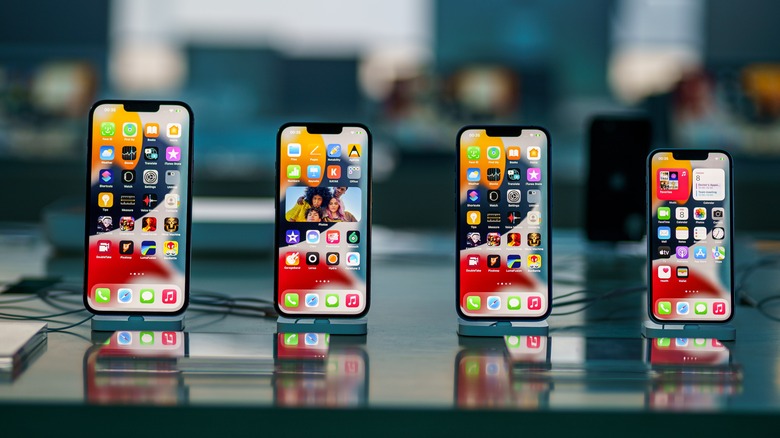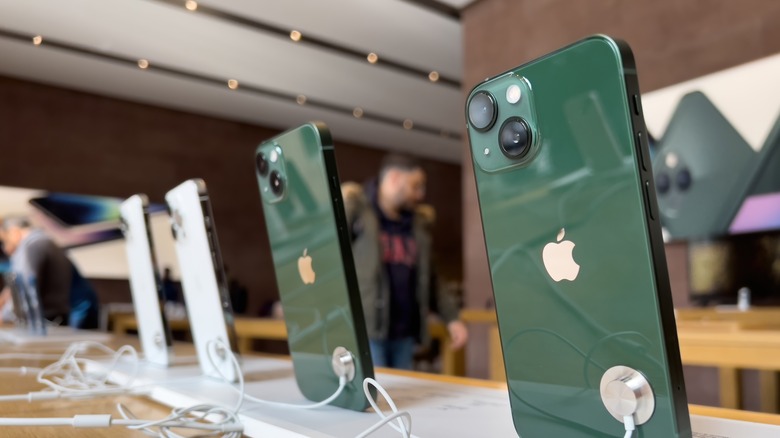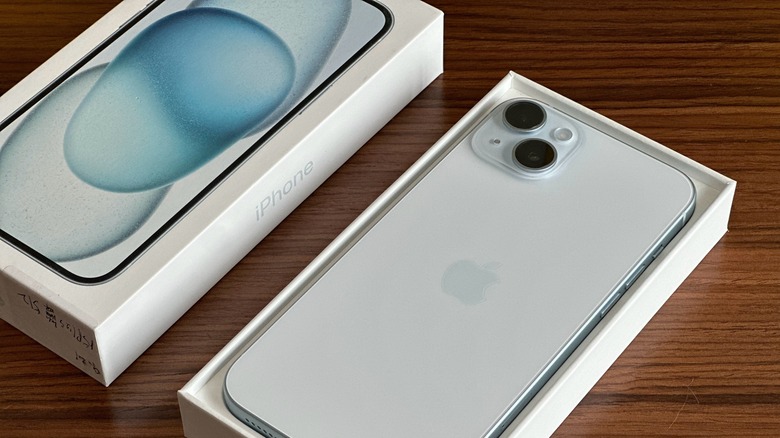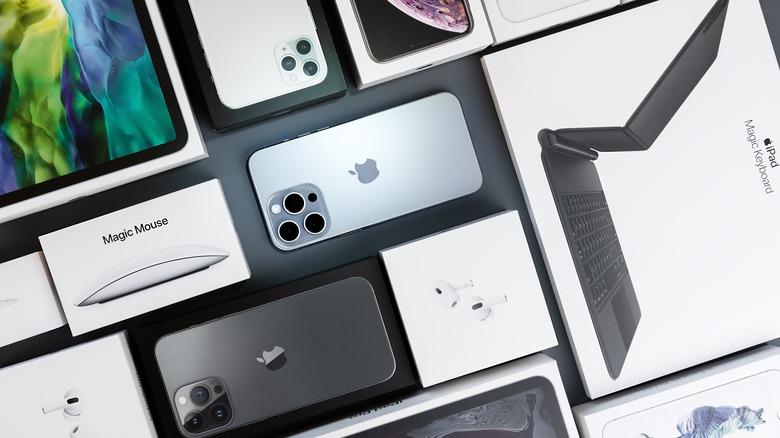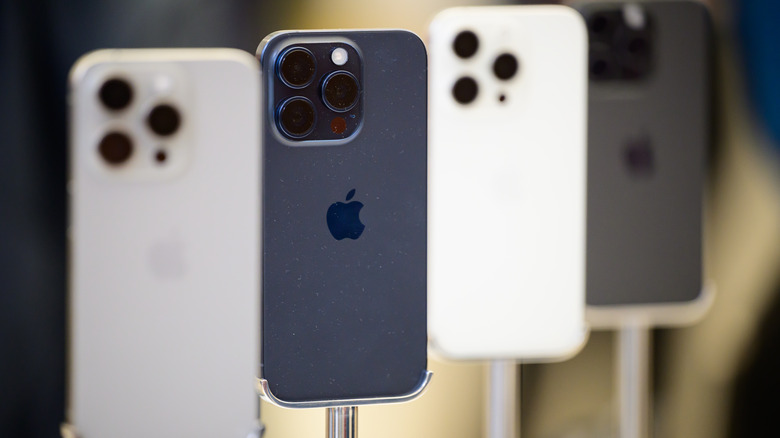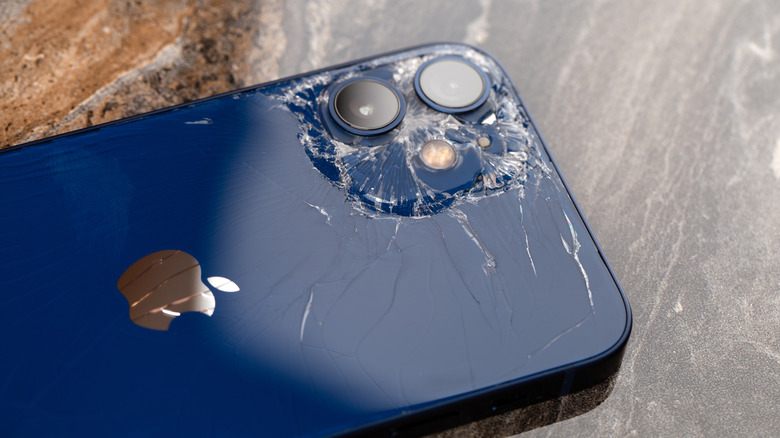Is It Cheaper To Buy A Phone Abroad?
For years, Apple has positioned the iPhone as a somewhat aspirational product. When it first launched the iPhone, Apple revolutionized smartphones as we know it and made touchscreen the standard for smartphones everywhere. On the other hand, Apple sells most of its devices at a premium price point, which makes it less affordable to the average person. Given this, it's unsurprising that people are looking for cheaper iPhone, even resorting to buying them abroad.
Apple has released relatively cheaper options in the past, like the iPhone SE line, which uses components of previous models to reach lower price points. However, those looking to for updated versions of the iPhone SE may have to wait a bit longer, as rumors have oscillated between of its cancellation and revival this year.
Unfortunately, Apple doesn't slash prices on its new iPhone models very often in the United States. Instead of discounts, Apple Stores may reduce the prices on the iPhone through product bundles and gift cards. However, this doesn't mean that Americans get a bad deal, especially because even without discounts they already enjoy some of the lowest iPhone prices in the world. Despite this, there are ways that an iPhone can be cheaper abroad. Here's how.
How to know if an iPhone is cheaper abroad for you
Aside from the base price and sales, there are other factors that impact if buying an iPhone abroad is overall a better financial decision. There are two things to consider when buying an iPhone abroad: currency conversion and tax refunds.
In some cases, iPhones can appear cheaper simply because your native currency is performing better than the currency of the country you are visiting. When it comes to currency conversion, you'll also want to check your bank's foreign exchange rates or the estimated fees based on the cash you plan to convert upon arrival. If you haven't already, you can check out our recommendations for the best currency conversion apps for traveling. Additionally, if you're a tourist or visiting a country temporarily, there are over 60 countries that offer tax-free shopping privileges in the world. For example, shoppers in Japan will get a 10% VAT refund at authorized retailers, which includes electronics.
Because conversion rates and taxes vary per country, you'll need to check the official websites of the country you are visiting for more information, including if you need a customs inspection of the device upon exit. Due to the compounded impact of conversions and tax exclusions, buying a more expensive iPhone will likely yield more significant discounts that can offset the effort (and risks) of buying an iPhone abroad, compared to a cheap or base model version.
Countries where iPhones are cheapest
In the United States, Apple lists the iPhone for $799, but the actual price will vary depending on if your iPhone is unlocked or with a carrier and your state and local tax. For example, an unlocked 128GB iPhone 15 sold in San Diego, California, will cost an estimated $893.25 when purchased from the official store.
But in markets where Apple's grip on the smartphone market isn't as firm, you're more likely to see competitive prices. In May 2024, CNN reported that Chinese consumers enjoyed up to 23% discount on iPhones during a sale on the Alibaba-owned e-commerce platform, Tmall. At the time, consumers could buy a 128GB iPhone 15 for as low as 4,599 yuan (est. $635), which is $149 cheaper than U.S. Apple Store prices for the same model before taxes. Although South China Morning Post claims that prices on the official Apple Store did not move for this particular sale, it does offer the iPhone 15 base model for 5,999 yuan (est. $830). However, you'll need to make sure you buy it tax-free or pay an additional sales tax.
Surprisingly, Japan takes the cake for being the cheapest place to buy the brand new iPhone 15. Direct from the Japan Apple store, the iPhone 15 128GB clocks in at 124,800 yen (est. $794), which doesn't even include its special tax incentives for tourists that will slash another 10% off the price for authorized retailers.
Why not all iPhones are the same everywhere
Depending on the country where you plan to buy an iPhone, the difference in models can range from mildly inconvenient to making it downright unusable for your needs. For example, if you buy an iPhone in Japan, you'll need to know that the shutter sound when taking photos with the camera can't be muted when you're in the country, no matter what SIM card you are using. Thankfully, some users with Japan-made iPhones have reported that with iOS 15, you'll be able to turn off the shutter sound when you're not physically in Japan and are using a foreign SIM card. That being said, if you can't live with the shutter on forever, it's not recommended to buy an iPhone from Japan if you're buying an older model that can't be updated to iOS 15.
If you're a frequent traveler and rely on eSIMs to get by, you may not want to purchase an iPhone from Hong Kong, Macau, or the Chinese mainland, where select iPhone models can only accommodate dual nano-SIM cards. However, some people may not think of this as a deal-breaker, especially if you prefer to use Wi-Fi sticks instead when you travel. If it's your first time going abroad and you're unsure what option is best for you, you can check out our guide for deciding whether you should use an eSIM or Wi-Fi stick for traveling.
Tips for buying iPhones abroad
Unless you plan to stay in that country for long periods, don't buy a brand new iPhone as part of a plan from a carrier abroad. In many cases, it will be locked to its service provider until the contract expires, preventing you from using your local sim back in your home country. If you try to run away, they can still remotely disable your iPhone's ability to connect to any carrier.
When buying secondhand iPhones abroad, try to stick to reputable sellers or chain retailers with proven reviews from other travelers. Unlike buying from sidewalk vendors, big retailers have some accountability if there's an issue, are less likely to have stolen, and will likely have better return policies. While you're at it, you should also consider official Apple refurbished products. If possible, try to get a sense of pricing in the country both from other local retailers or online before committing. After all, your city may have similar deals as well.
And of course, test the iPhone thoroughly, including hardware, software, and carrier access. If your lifestyle is relatively tame and you seldom travel to the covered countries, you may not feel the need to get additional insurance. However, if you break your phone often, you'll want to factor the cost of insurance when computing if it's cheaper to buy an iPhone abroad or not.
Warranty coverage for iPhones bought abroad
Unfortunately, even if you do buy from an authorized Apple retailer, its one-year limited warranty will only be covered in the country wherein you purchased your device. Additionally, the option to return or exchange your iPhone will depend on the consumer protection laws of that country, as well as the specific retailer. Thankfully, while Apple Care+ has pros and cons, it also has international serviceability. Although that doesn't cover everything, like if your iPhone gets damaged from third-party accessories like wires or plugs, so you might want to consider alternative insurance plans for your needs.
On the other hand, if you do avail of the Apple Care+ Theft and Loss Coverage, you can claim for incidents twice, annually. You can even receive a replacement phone via mail in countries where this plan is offered (if you meet certain criteria and willing to pay the $149 added service fee). As of this writing, there are 18 countries including the United States that offer Apple Care+ iPhone Theft & Loss Coverage. Depending on what iPhone model you own, the cost of this kind of global protection can be as low as $7.49 monthly for iPhone SE (3rd gen) to $13.49 for the higher-end models, like the iPhone 15 Pro or iPhone 15 Pro Max. Alternatively, you can opt for fixedterm, two-year plan, which can be significantly cheaper in the long run.
